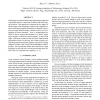Free Online Productivity Tools
i2Speak
i2Symbol
i2OCR
iTex2Img
iWeb2Print
iWeb2Shot
i2Type
iPdf2Split
iPdf2Merge
i2Bopomofo
i2Arabic
i2Style
i2Image
i2PDF
iLatex2Rtf
Sci2ools
107
click to vote
ICIP
2005
IEEE
2005
IEEE
A hybrid medical image segmentation approach based on dual-front evolution model
In this paper, a hybrid medical image segmentation approach is proposed based on a dual front evolution and fast sweeping evolution. This approach is composed of two stages. In the first stage, a fast sweeping evolution with a stopping criterion based upon gradient information is adopted to give a fast and rough initial boundary estimate close to (or overlapping) the actual boundary. Next, a morphological dilation is used to expand this boundary to a narrow region large enough to contain the actual boundary. In the second stage, a dual front evolution model is used to refine the final segmentation result. In this step, the evolution speeds consider the gradient information together with less local image statistics to improve the veracity and compatibility of the algorithm. The experimental results show that this two-stage algorithm can provide close, smooth and accurate final contours with low computational complexity O(N).
Related Content
| Added | 23 Oct 2009 |
| Updated | 14 Nov 2009 |
| Type | Conference |
| Year | 2005 |
| Where | ICIP |
| Authors | Hua Li, Anthony J. Yezzi |
Comments (0)

